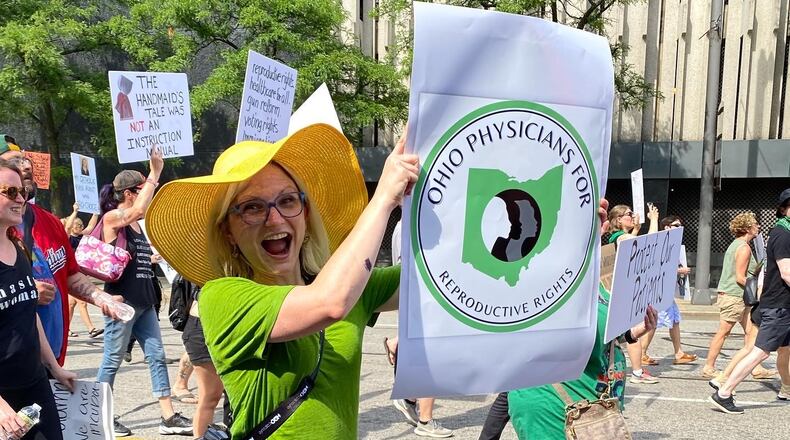“A government that takes away the freedom of women to access critical medical care and threatens physicians with criminal penalties for upholding their oath is un-American,” the group wrote in the letter.
The doctors took their advocacy to the streets of Cleveland to join the July Fourth Women’s March over the holiday weekend. They’re hoping to take the conversation to the governor’s desk next, according to Stephanie Pope, a Cleveland-based psychiatrist. They will be requesting to meet with DeWine to share their concerns for reproductive healthcare under Ohio’s new abortion laws.
DeWine spokesman Dan Tierney said Friday that the governor had no formal statement in response to the doctors group, but added, “The governor believes Ohio has an obligation to protect all life, and that includes the unborn.”
In DeWine’s statement the night of the Supreme Court’s Dobbs decision, he called for civility and respect for people on both sides of the abortion debate. He emphasized Ohio’s need to lower maternal and infant mortality rates and increase awareness for adoption resources. The governor also championed the “Bold Beginning” initiative that has invested over $1 billion to connect expecting mothers with parenting resources, mentoring and prenatal care.
Pope was invited to join Ohio Physicians for Reproductive Rights by two doctors, Lauren Bean and Marcela Azevedo, who formed a Facebook group for physicians in reaction to the Supreme Court’s June 24 ruling. In just under a week, the group grew from dozens to hundreds and the signature campaign began.
Pope said one of the motivations behind the group was making sure patients know their physicians respect the “sanctity of doctor-patient relationships” and are advocating for them.
“We know how important it is to have the trust of our patients in our medical knowledge, and there is no place for a politician in that discussion,” Pope said.
The Ohio Physicians for Reproductive Rights called on the governor and state officials to repeal the Heartbeat bill. The letter also asked Ohio physicians to “uphold their duty to their patients” and for patients to be vocal about advocating for their own bodily autonomy.
Dayton Right to Life, a local pro-life nonprofit, believes the letter to be misleading. Executive Director Margie Christie said the letter “only causes fear and confusion among mothers.”
“These medical professionals are purposely misleading mothers to abortion,” Christie said. “Clearly, if a doctor is trying to save the mother and the baby passes, that is not an abortion. A doctor must ‘do no harm’ to both patients.”
Christie also defended the Heartbeat Bill by citing the Charlotte Lozier Institute, an anti-abortion research group, and said that state abortion laws have exemptions to save the mother in life-threatening circumstances.
“The Heartbeat law does not prevent healthcare for a woman with an ectopic pregnancy,” Christie said. “It does not prevent any type of healthcare for the mother.”
President Joe Biden signed an executive order Friday to help safeguard abortion access and mitigate the legal consequences of mothers seeking abortion. The order is limited in its ability to protect reproductive rights, which the president acknowledged. He encouraged people to go out and vote in the November midterm elections to “reclaim the rights that were taken from them by the court.” Shifting the congressional majority in the Senate might allow for the codifying of Roe, according to Biden.
“The fastest way to restore Roe is to pass a national law codifying Roe, which I will sign immediately upon its passage,” Biden said.
In his speech on the executive order, Biden discussed a 10-year-old rape victim from Ohio who had to travel to Indiana to get an abortion after she was denied one under Ohio law. Indiana law currently bans abortion after 22 weeks with some exceptions.
“I can’t think of anything more extreme,” Biden said of the situation.
Other neighboring states have varying levels of abortion legislation in place after the fall of Roe v. Wade. Similar to Indiana, Pennsylvania bans abortion up to late in the second trimester at 24 weeks. Kentucky’s total abortion ban has been temporarily suspended by a judge, and an injunction is preventing a 1931 Michigan ban from being enforced. In West Virginia, abortion is banned with no exceptions for rape or incest.
Ohio Physicians for Reproductive Rights is working with like-minded groups from within Ohio and neighboring states to further the conversation on reproductive healthcare and collaborate on future advocacy work. Some of those conversations began at the Women’s March and through publicizing the letter, Pope said.
“Our primary goal is to help our patients get access to reproductive healthcare,” Pope said. “With that goal, that means advocacy, that means communicating with (patients) on how to get that care and connecting them to those resources.”
About the Author


